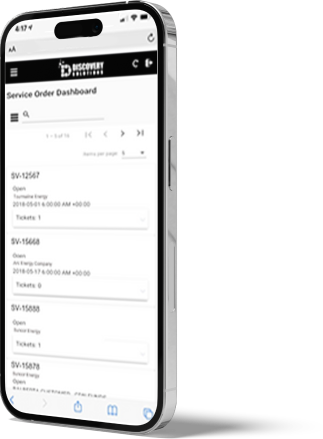How an ERP Can Help Oilfield Service Companies Thrive in a Recession



If you’re reading this today, it is almost certain that you work in the oilfield services industry. This means you’re probably struggling to find places to cut costs and boost efficiency.
We have seen oil prices drop after a summer of highs. We saw international benchmark Brent crude numbers in mid-June trading at over $123 per barrel. As of October 2022, we’re looking at $88.79, a drop of 28%. Oil demand continues to look strong but factors outside of oil and gas are uncertain.
This a good reminder you need to find new ways to run leaner and smarter, to stay competitive.
In fact, there is a way to slash the cost of expensive mistakes, shorten your cash conversion cycle, and make more informed business decisions: Introduce a TRUE ERP (Enterprise Resource Planning) solution into your business.
Costly Problem: Frequent Mistakes in Accounting & Invoicing
If mistakes are eroding your profits, it’s probably not your team’s fault.
Far too many companies in this sector are still relying on old-fashioned clipboards, pens, and papers. Or they’re using only slightly more effective spreadsheets.
A lot of oilfield services companies may look around and see a lot of their competitors using these systems, so they assume it’s “good enough.” What they don’t see is how much money they’re losing to being “good enough.”
These systems are fundamentally flawed because they rely on a lot of double-entry for simple tasks and transactions. And double-entry means doubling the chances for errors.
Let’s take a look at a simple ticket filled out in the field or on the shop floor. A handwritten ticket is filled out by a frontline employee. They do their best to write the ticket, but they’re often distracted and want to get back to work. Next, they hand the ticket off to someone else that enters the information into the system. Next, that second employee needs to read and make sense of the information on the ticket, and then key that data into whatever combination of systems they are using.
How many times does that process repeat itself every day? How many potential mistakes is that? How much money is that going to cost you?
Solution: Use an ERP to Digitize the Process and Eliminate Double Entry
To be clear, you need the RIGHT ERP to eliminate double entry. Using the wrong system will only exacerbate the problem, while charging you money to do it.

Most ERPs (Oracle, SAP) are built to try to serve as many industries as possible. This means that they weren’t built with the oilfield services sector in mind. In fact, if you try to use one of those solutions in this sector, you will still struggle with a lot of double-entry and profit-killing mistakes.
Meanwhile, your industry-specific rental, field service, sales, work orders and purchase orders can all be entered into a single tool that was built with the oilfield services industry in mind: Discovery Solutions.
For example, we have an internal PO variance system that helps you track the difference between purchase order cost and supplier invoice cost. And then, those cost differentials can flow back to your weighted average cost and inventory so that you have much more accuracy in your financials and in your assets, which gives you better order margin accuracy.
Costly Problem: Lagging Cash Conversion Cycle
One of the most common problems in the oilfield services sector is a lagging cash conversion cycle (CCC). Too many companies feel like their money is “stuck,” because it takes too long to go from performing the work to getting paid. There always seems to be friction in between.
This includes:
- Invoicing errors due to inaccurate or missing paperwork orders/invoices, or the double entry mistakes we mentioned earlier
- A disorganized invoicing system, possibly spread across 2-3 different systems
- Not being able to get field tickets signed/ processed
- Frequent rework, in the office or in the field
- No visibility in the overdue accounts receivables
Oftentimes, a company may be struggling with all five of those problems.
Solution: Use an ERP to Shorten Your CCC
First and foremost, Discovery’s purpose-built system can help you eliminate manual entry, double entry, and lost tickets.
Your field staff can use our Digital Field Ticketing software to enter the results of a job while in the field. This means they can produce a priced field ticket on the spot for the customer to sign. From there, that information is instantly propagated upwards to Discovery’s ERP system for review and invoicing.
At the same time, our ERP gives you a 360-degree view of your financials at all times, which includes real-time information on the status of all accounts receivables.
Costly Problem: We Don’t Have the Data to Make Informed Business Decisions
Your business’ higher-ups need fresh and accurate data to make high-level decisions about where to go with the business. But, you can’t do that if you know for a fact that your information is stale or inaccurate. Once again, you’re being forced to cope with “good enough” and make your best-educated guess on the actual state of your finances and operations. But this is too important for guesswork.

Solution: Real Data. Real Insights.
A lot of our customers tell us that the biggest benefit to switching to Discovery is that their accounting staff is no longer stuck entering the data that they're supposed to be analyzing. Now, they finally have the information to make informed recommendations and decisions.
This has never been more important than it is today. Right now, the companies that will survive the recession are the ones that can be as reactive and nimble as possible. Trends and changes don’t care how ready you are for them. You need to be able to react and evolve as quickly as possible. You can’t do that by staring at spreadsheets or hand-written tickets.
Costly Problem: Your ‘Frankenstein’ System isn’t Working
In an attempt to modernize your operations, you may have added a digital tool here, and another one there.
Maybe you’re using QuickBooks for some of your accounting, combined with another third-party “bolt-on” solution because QuickBooks can’t do X. And you have a spreadsheet-based tracking system for Y.
You will soon reach a point where your mish-mash of systems becomes Frankenstein’s monster. You will also soon reach a point where the double entry, mistakes, and rework required to use this system are out of control.
At the same time, if the person (and there’s typically just one) who manages and understands this system is sick for a few days, the back end of your business will pretty much come to a halt.
Solution: A TRUE ERP
Companies in this industry are moving towards a digital migration right now. Some will struggle with the Frankenstein model for a few years, but the smart ones are going with a true ERP solution that was purpose-built for the oilfield services sector.
When you have a true ERP, there is no need to worry about compatibility issues, or System A not being able to interact with System B. Everything simply works, so you can focus on the activities that drive your business forward.

Book a Call





